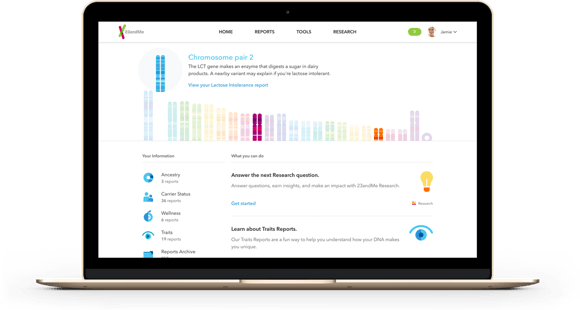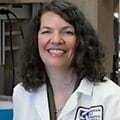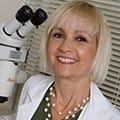Our fertility study
We've had a great response to this study – we are no longer accepting new participants.

Want to stay in touch about future fertility research opportunities? Email us at fertility-study@23andMe.com.
You can participate in this study if:
- You are female, 18-45, have access to the Internet and live in the United States.
- One of the following circumstances applies to you:
- You think you may become pregnant within the next 6 months
- You are actively trying to conceive
- You are pregnant
- You have been pregnant in the last 12 months
- You have a male partner with whom you are trying to conceive using no medical assistance.
- Your male partner has provided permission for you to answer survey questions pertaining to his health history.
- Your male partner has not had a vasectomy, testicular surgery/infection, or erectile/ejaculatory dysfunction. He cannot have been diagnosed with any condition known to cause infertility or be taking medications known to adversely impact male fertility.
- You have not had your ovaries, uterus or fallopian tubes surgically removed, tied, or operated on.
- You have not undergone chemotherapy and/or radiation therapy. This restriction applies to your male partner as well.
Why your help is so important.
Every mother's experience is different, including her journey to pregnancy. Some women conceive right away. For others, their journeys can take longer. According to the Centers for Disease Control and Prevention, 1 in 8 women who try to get pregnant will struggle to conceive and doctors have limited tools for determining these outcomes.
We believe genetic information could help women, with their doctors, understand their potential to get pregnant, carry a pregnancy to term and identify their treatment options if needed. To get there, we need to learn more. Your DNA, survey answers and your unique stage of life could play a critical role in helping researchers understand how fertility differences are expressed in our genes.
Join us and thousands of women who want to make a difference.

How it works. It's just saliva and surveys.
Provide a saliva sample
We'll mail a DNA saliva collection kit to you with instructions. No blood tests or trips to a testing site.
Surveys
When you enroll, we will ask you to complete a 15- to 25-minute background survey about your fertility journey and the health history of both you and your partner. We ask that you get your partner's permission to answer questions pertaining to his health history.
Next, we'll ask you to complete eight additional short follow-up surveys – once every other month. Each survey should take 10-15 minutes to complete. At the end of the study, we will ask you to take your final 10- 15-minute survey.
Your participation will take about 2 hours and 40 minutes in total over the course of 18 months.
You control your data. Here is how we protect and secure your information.
What you get by participating.
The 23andMe experience
When you participate in this study, if you are new to 23andMe, not only will you contribute to understanding the genetics of fertility, but you’ll also receive access to over 65 personalized genetic reports online about your ancestry, traits and health.
Compensation
To thank you for your time, we will send you the following compensation in Amazon eGift Cards after you complete each step:
- Background survey and saliva sample return: $25
- Follow-up surveys (8) - $5 each
- Final survey - $25
- Existing customers - an additional $20 for agreeing to the terms of this study

A little bit about us.

23andMe was founded in 2006 to help people access, understand and benefit from the human genome. A key part of our mission is to use our platform to better understand how DNA affects people's health and ancestry.
We have more than three million genotyped customers around the world and over 80% of them have consented to participate in our research. Together, we believe that the power to affect change increases with the number of people participating in research and with greater amounts of data for researchers to mine and analyze.
We use the Internet to bring people together to share their personal health and genetic data with researchers - regardless of how close they live to a clinic or research facility.
Celmatix® is a personalized medicine company focused specifically on fertility and women's health. Currently, there is no comprehensive genetic test that advises women on their likelihood of having difficulties conceiving. Through your participation, Celmatix can validate over seven years of fertility research to vet, and discover new genetic biomarkers that may impact the diagnosis and treatment of infertility and help women understand their own fertility potential.
Meet our scientific advisors.

Aaron B. Caughey, MD, PhD
Oregon Health & Science University
Aaron B. Caughey, MD, PhD is Professor and Chair of Obstetrics and Gynecology and Associate Dean for Women's Health Research and Policy at Oregon Health & Science University in Portland, OR. His medical training was at Harvard Medical School and he also earned a Master's Degree in Public Policy from the Kennedy School of Government, and both an MPH in Epidemiology and a PhD in Health Economics at the University of California, Berkeley. His residency training was at the combined Brigham and Women's Hospital and Massachusetts General Hospital program and his fellowship in Maternal-Fetal Medicine was at the University of California, San Francisco. His research is focused on utilizing epidemiologic, biostatistical, decision analytic methods, and clinical trials to examine clinical questions related to complications of term and preterm pregnancies, gestational diabetes, and prenatal diagnosis.

Jorge E. Chavarro, MD, ScD
Harvard School of Public Health
Jorge E. Chavarro, MD, ScD is Associate Professor of Nutrition and Epidemiology at the Harvard School of Public Health. Dr. Chavarro's research revolves around investigating the role of diet in the pathogenesis of diseases affecting reproductive and other hormone sensitive organs. Currently, his main focus is on understanding how different nutritional and metabolic factors influence fertility, in women and men, as well as treatment outcomes in couples undergoing assisted reproduction. He also devotes substantial research efforts to investigating the role of nutrition on the pathogenesis of pregnancy complications and malignancies of reproductive organs. He currently serves as the Immediate Past Chair of the Nutrition Special Interest Group of the American Society for Reproductive Medicine.

Alan B. Copperman, MD
Mount Sinai School of Medicine
Dr. Alan Copperman, MD is Director of the Division of Reproductive Endocrinology and Infertility as well as the Vice-Chairman of the Department of Obstetrics, Gynecology, and Reproductive Science at Mount Sinai Medical Center. He is a Clinical Professor of Obstetrics, Gynecology, and Reproductive Science at the Mount Sinai School of Medicine and serves as Medical Director of RMA of New York. He is an experienced and respected clinician and has published numerous award-winning papers and textbook chapters on egg freezing, infertility, in vitro fertilization, and pelvic surgery. Dr. Copperman received his undergraduate degree from the University of Pennsylvania and his medical degree from New York Medical College. Dr. Copperman is board certified in reproductive endocrinology and infertility as well as in obstetrics and gynecology.

Dolores J. Lamb, PhD, HCLD
Baylor College of Medicine
Dolores J. Lamb, PhD, HCLD, directs the academic Center for Reproductive Medicine and is the Lester and Sue Smith Chair in Basic Urologic Research, Vice-Chair for Research, Director of the Laboratory for Male Reproductive Research and Testing, and Professor in the Departments of Urology and Molecular and Cellular Biology. She is an investigator in the fields of urology, male and female reproduction, infertility steroid hormone action, and growth regulatory mechanism. She directs two clinical diagnostic laboratories specializing in diagnosis of male reproductive and urologic defects as well as a sperm bank for fertility preservation. She served as the first Ph.D. President of the American Society for Reproductive Medicine in 2011-2012 and currently serves as President of both the American Association of Bioanalysts and the Society for Women in Urology.

Stacey Missmer, MD, ScD
Michigan State University
Stacey Missmer, MD, ScD received her Masters and Doctor of Science (Sc.D.) degrees in Epidemiology from Harvard School of Public Health. She joined the faculty of Harvard University in 2003 and was promoted to Associate Professor in Obstetrics, Gynecology, and Reproductive Biology at Harvard Medical School and of Epidemiology at Harvard School of Public Health in 2012. She served as Director of Epidemiologic Research and the Fellowship Research Director for the Division of Reproductive Medicine at Brigham and Women's Hospital. She is currently Professor in the Department of Obstetrics, Gynecology and Reproductive Biology in the College of Human Medicine at Michigan State. She serves as Chair-elect of the Endometriosis Special Interest Group and is also Chair of the Nutrition Special Interest Group for the American Society of Reproductive Medicine.

Lynn Marie Westphal, MD, FACOG
Stanford University
Lynn Marie Westphal, M.D., FACOG, graduated summa cum laude from Lawrence University, earned her M.D. degree at Stanford University, and did her residency training in obstetrics and gynecology at UCLA and Stanford University. Dr. Westphal joined the full-time faculty at Stanford University in 1998 and is a Professor in the Department of Gynecology and Obstetrics, Director of the Fertility Preservation Program, Director of the Third Party Reproduction Program, and Director of the REI Fellowship. Her interest in fertility preservation for cancer survivors led her to set up one of the first oocyte cryopreservation programs in the country. She co-founded the Stanford Center for Health Research on Women and Sex Differences in Medicine.
FAQs and Resources
Still have questions about our fertility study? Here are a few of the things people frequently ask about.
Don't see your question here? Get in touch with us at fertility-study@23andme.com.
Still have questions about our fertility study? Here are a few of the things people frequently ask about.
Don't see your question here? Get in touch with us.
Participation
It is an online-based research study designed to answer one main question: how does DNA impact a woman's reproductive health and ability to conceive?
Currently, many of the causes of infertility are unknown, but previous research suggests that there may be a strong genetic component involved. The 23andMe online-based platform enables a large group of individuals to come together to provide valuable data to researchers. This research data includes genetic information (using DNA from saliva) and information about each participant's unique experiences with fertility (using responses from online surveys). Conducting research using this data may help improve diagnosis and find better treatments.
Your DNA, survey answers and your unique stage of life could play a critical role in helping researchers understand how fertility differences are expressed in our genes.
We believe this research could lead to better diagnostic tests, new treatments for infertility and, ultimately, tools that could help women of all ages make proactive decisions about their reproductive potential and health.
At this time, the 23andMe® Personal Genetic Service does not include health reports on fertility.
It means that you will agree to contribute your information for research purposes. There are many aspects to being a research participant. We have summarized the most important ones below. If you have more questions, you can contact us at fertility-study@23andme.com.
What will I be asked to do?
You will be asked to:
- Enroll and consent to our fertility study through this website.
- Respond to a short questionnaire to determine your eligibility to participate. This step is very important to ensure the integrity of the study.
- Complete a 15- to 25-minute background survey, which will be available immediately after enrolling. It will include questions on your fertility journey and the health history of both you and your partner.
- Provide a DNA sample (from your saliva) for analysis and send it back to 23andMe. It's very important to send back your saliva sample within 30 days of receiving your saliva collection kit to secure your spot in the study. Since our goal is to accelerate fertility research, we cannot guarantee your enrollment in the study if you do not send your kit back within 30 days of receipt.
- Allow 23andMe to keep this saliva sample stored in our laboratory by consenting to biobanking.
-
Two months after you complete your background survey, we'll ask you to complete
eight additional short follow up surveys – one every two months.
- Each survey should take 10-15 minutes to complete. We will send you notifications when your next follow-up survey is ready and will send reminders if you haven't finished all available steps.
- All follow up surveys will be identical and will include questions about the current status of your fertility journey as well as your and your partner's health.
- Your final survey will be available 18 months after you complete the background survey and will include questions similar to previous surveys. This survey should take about 10-15 minutes to complete.
What if I no longer want to participate in this research?
You can withdraw from research at any time by changing your consent status in your account settings. Email us at fertility-study@23andme.com and we can help you.
How will 23andMe use my data?
When you participate in this study, 23andMe will use your information in two key ways: 1) in order to provide you services as a customer of 23andMe and 2) for research purposes.
We use your data to operate, provide, analyze and improve our services. These activities may include, among other things, using your information to:
- open your account, enable purchases and process payments, communicate with you, and implement your requests (e.g., referrals)
- process and deliver your genetic testing results
- offer new products or services to you, including through emails, promotions or contests
In order to enroll in our fertility study, you will need to agree to several consent documents which enable us to use and share your data in the following ways:
Data summaries:
When you agree to the general 23andMe Research Consent Document, you are giving consent for 23andMe to include your genetic and self-reported information in data summaries we share with qualified third party researchers. This research could cover many different topics studied by 23andMe and our research collaborators.
Non-summarized, individual-level data:
When you agree to the fertility study consent document, you will consent to share individual, non-aggregated data with our qualified third party researchers. This means we can share your individual genetic and self-reported data with third party researchers without bundling it. The information we share about you with our research collaborators will be stripped of identifying components (name, email, address, user ID and password). These researchers will only be able to use your data to study fertility and related conditions.
We encourage you to read these consent documents carefully. For your records, you can print each of the consent documents or review them at any time by going to your account settings. If you have any questions, don't hesitate to reach out to us at fertility-study@23andme.com.
What are the privacy risks of being a research participant?
- Being a research participant means that 23andMe will store your genetic information and survey answers (this includes responses to questions or surveys you might feel are sensitive in nature) and securely transfer them to qualified research partners. If a security breach occurred, your data could be leaked. Please refer to How do you protect the confidentiality of my data? for more information about this risk.
- If you are not already a 23andMe customer, you may learn information about yourself that you do not anticipate (e.g., that you are not related to a family member in the way you thought, or surprising facts related to your ancestry).
- Please refer to our Terms of Service for more details about the risks of being genotyped.
What are the advantages of being a research participant?
This is a new opportunity to participate in genetics research and fertility.
As a research participant, you:
- Could play a role in helping researchers understand how fertility differences are expressed in our genes
- Will be kept informed of the discovery process as research advances
- Will have the option to learn more about your genetic health and ancestry
What do I need to do to participate?
- Enroll, provide consent and answer questions to determine your eligibility through the 23andMe website.
- If you haven't already, provide a saliva sample and send it back in the pre-paid postage box. If you don't believe you will be able to complete this step within 30 days, we recommend that you do not participate in this study.
- Complete online surveys - once every other month - over the course of 18 months. After you complete your background survey, we will send you notifications once every other month when your next survey is ready. We will send reminders if you haven't finished all the available steps.
Do the 23andMe Terms of Service apply to participants in the Celmatix and 23andMe Fertility Study?
If you agree to participate in the Fertility Research Study, your participation includes the use of a 23andMe DNA kit and optional access to the 23andMe Service at no cost. As part of registering this 23andMe kit you will be required to agree to the 23andMe Terms of Service document.
We want to make sure you understand that while participating in the study activities described below, the following sections of the Terms of Service will not apply to the extent they prevent you from pursuing a claim if you suffer a research-related injury:
- Section 14 ("Indemnity")
- Section 23 ("Disclaimer of Warranties"), Subsections (1), (3), (4), and (5)
- Section 24 ("Limitation of Liability")
- Section 28(d) ("Term for cause of action")
Study activities include:
- Providing a saliva sample for genetic analysis using a 23andMe DNA kit.
- Completing the fertility study surveys on the 23andMe website.
Please note, however, that if you choose to use any of 23andMe's products, software, services, and website, outside of your participation in these study activities, you will be, just like all users of 23andMe's products, software, services, and website, subject to the 23andMe Terms of Service.
Surveys will mostly include questions about your fertility journey and the health history of both you and your partner.
Some survey topics may be highly personal and difficult to discuss, and answering some of the questions may cause emotional discomfort. We ask these questions to capture the most complete picture of your situation. The more information we have about your medical history and experience with your fertility journey, the more helpful your answers are to gaining new insights and making real discoveries.
Please note that participation in this research study is completely voluntary, and you may stop answering surveys at any point, for any reason. You can decline to answer any questions you do not wish to answer.
Our goal is to enroll 4,500 participants in this study.
As additional opportunities come up, we will communicate these in study newsletters, emails, and/or in your 23andMe.com homepage.
If you misplace your kit, don't worry. Email us at fertility-study@23andme.com and we'll mail you a new one at no cost.
Once you're enrolled, we'll send you reminders to return your kit.
Please know that to secure your spot in the study, you will need to send back your saliva sample to our lab within 30 days of receiving your kit. To make sure we conduct research as quickly as possible, we cannot guarantee your enrollment in the study and may close your 23andMe account if you do not send your kit back within this timeframe. If you've had your kit for 30 days or you aren't sure how long you've had your kit for and would still like to participate in this study, feel free to email us at the address listed above to see if we can extend this timeframe.
We're here to answer your questions. Email us at fertility-study@23andme.com and we'll get back to you within 3 business days.
Existing and New Customers
Existing customers are customers who purchased a 23andMe kit prior to joining the study. Customers are our research partners and we welcome them to see if they are eligible to participate in the fertility study!
However, please know that the product experience will not change as a result of an existing customer's participation in a study. If an existing customer purchased the Ancestry Service, she will not gain access to the Health + Ancestry Service without purchasing an upgrade. No customers receive health reports on fertility at this time.
New customers have not yet purchased or received a 23andMe kit prior to enrolling in this study. If they enroll in this study and meet the eligibility criteria, new customers will receive the 23andMe Health + Ancestry Service, including a DNA test kit, at no cost.
Compensation
Existing customers are customers who purchased a kit prior to joining the study.
When existing customers join our fertility study and complete surveys, they will receive Amazon eGift cards as compensation (amounts listed below). Participants will only receive compensation for the surveys that have been fully completed, and will be compensated up to $110 for their participation in the study.
A participant will receive follow-up surveys only once the background survey has been completed. Participants who do not complete the background survey will not be able to take any of the follow-up surveys, and therefore cannot receive compensation for those surveys. 23andMe will provide compensation to participants who are existing customers at the completion of each task as outlined below:
Completion of the background survey: $45 - includes an additional $20 as a thank you for purchasing the 23andMe experience prior to enrolling
Completion of follow-up survey 1-8: $5 each
Completion of final survey: $25
New customers will receive the 23andMe Health + Ancestry Service at no cost. This includes customers who did not purchase a DNA test kit from 23andMe prior to joining the study.
When new customers join our fertility study and complete surveys, they will receive Amazon eGift Cards as compensation (amounts listed below). Participants will only receive compensation for the surveys that have been completed, and will be compensated up to $90 for participation.
Follow-up surveys will only appear once the background survey has been completed. Participants who do not complete the background survey will not be able to take any of the follow-up surveys, and therefore cannot receive compensation for those surveys.
23andMe will provide compensation to participants who are new customers at the completion of each task as outlined below:
Completion of the background survey and returned saliva sample: $25
Completion of follow-up survey 1-8: $5 each
Completion of final survey: $25
Existing customers will be compensated up to $110 for participation and new customers will be compensated up to $90 for participation.
Because existing customers purchased the 23andMe® Personal Genetic Service prior to joining the study, they are offered additional compensation of $20 for completing the background survey.
Please email fertility-study@23andme.com if you believe you have completed study steps but haven't received compensation.
23andMe® Personal Genetic Service
As part of your participation in this research study, you will receive complimentary access to 23andMe®'s Personal Genetic Service. With the Health + Ancestry Service, you'll receive over 65 personalized reports on your health, traits and ancestry.
You will continue to have access to your 23andMe account and will receive report updates as long as the genetic information referenced in those updates is generated from your original DNA sample. If a future feature or report relies on DNA results not included in your initial analysis, you may need to purchase a new kit and provide an additional saliva sample to access that feature or report. Any future upgrades beyond the current technology are not included as a benefit to participation.
Security and Data Sharing
To increase the chance that meaningful scientific discoveries about your condition are made, 23andMe may share your de-identified, individual-level data with qualified research partners for this study and potentially for other studies in the future. 23andMe only provides de-identified data, which means that you cannot be easily identified by others (researchers, scientists, etc.).
The shared data will be stripped of all identifying components (name, email, address, user ID and password). If 23andMe shares your genetic or self-reported data with a qualified research partner, this action cannot be undone and your data will not be returned to 23andMe. Please refer to our Privacy Statement to learn more about our practices.
23andMe may share your de-identified, individual-level data with qualified research partners. Providing only de-identified data means that you cannot be easily identified by others whom we partner with in the future (researchers, scientists, etc.).
We built all of our systems to maximize the privacy and security of our research participants and we have a number of safeguards in place to ensure confidentiality. All data in the research computing environment are disconnected from your contact or identifying information and are coded with a unique research ID.
23andMe research scientists who have access to your sensitive data (i.e. DNA results, survey responses) do not have access to your account or contact information. Conversely, 23andMe project managers who have access to your contact information do not have access to your sensitive individual-level data. Thus, it would be extremely difficult for 23andMe employees or any external party to link your individually identifying information to your DNA results and survey response data.
Unfortunately, there are always unknown threats in information security. Therefore, we cannot fully guarantee the security of your data. However, we periodically update our security systems and protocols to protect your data from new threats, as they become known. We protect against known factors by applying industry best practices in all of our information security procedures.
All 23andMe research is performed in a secure computing environment with access restricted to research scientists and system administrators. All 23andMe servers are protected by technical, physical, and administrative procedures. Our servers are monitored for unauthorized activity. Your genetic data and sensitive account information such as passwords are encrypted, as are all data transfers between our servers and your computer(s).
23andMe will also have agreements with all research partners regarding the security and storage of de-identified, individual-level data that is shared outside 23andMe. Although 23andMe cannot provide a 100% guarantee that your data will be safe, 23andMe policies and procedures minimize the chance that a breach could take place.
If a commercial product is developed as a result of findings from this research, rights to the commercial product will belong to 23andMe and/or Celmatix and their collaborators (persons or companies partnering with Celmatix). You and your family will not receive any financial benefits or compensation from or have any rights in any developments, inventions, or other discoveries that might come out of this research.
Genotyping Resources
- The 23andMe® Service Read More
- 23andMe and your personal information Learn More
- How 23andMe safeguards your information Learn More
- 23andMe Research Learn More
- Genetics 101 Videos Watch Now
- 23andMe Terms of Service Read Now
- What unexpected things might I learn from 23andMe? Read Now